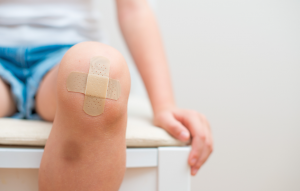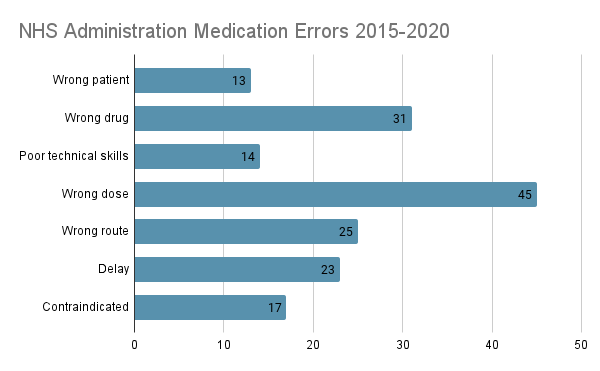If your child has suffered from medication errors in paediatrics, you may be looking into making a claim on their behalf. The harm that occurs due to medical negligence can cause serious damage and, in some cases, can lead to wrongful death.

This guide aims to cover the topic of child medical negligence claims and detail how you can seek a settlement. We will also discuss how negligence can occur and the impact this can have. Furthermore, you can see examples of compensation for medical negligence and what evidence you should supply in order to strengthen your claim.
Finally, you may also be interested in working with a solicitor on a No Win No Fee basis to represent you in your claim. This guide will highlight the benefits of these agreements and how you can start the medication errors in paediatrics claims process today.
Following on from reading this guide, our advisors are available 24/7 to help you with any legal queries and support you in starting the claims process.
- Call us: 0800 408 7827
- Contact us by completing the contact form
- Use the live chat
Choose A Section
- What Are Medication Errors in Paediatrics?
- Examples of Paediatric Medication Errors
- Who Is Liable for Medication Errors?
- What Evidence Can Be Used in a Hospital Negligence Claim?
- How Much Compensation Could Be Received For Medication Errors in Paediatrics?
- What are the Benefits of Using No Win No Fee Solicitors?
- Learn More About Claiming For Medication Errors in Paediatrics
What Are Medication Errors in Paediatrics?
Medication errors can occur at any stage of the prescribing process. For instance, any medical staff involved in preparing, dispensing, administering, monitoring or providing advice for taking medication could be responsible for a medication error.
All medical staff must take the necessary precautions to provide the right level of care and prevent patients from sustaining avoidable harm. Therefore, if negligence occurs and you have evidence of this causing unnecessary pain and suffering, you may have grounds to make a child medical negligence claim.
Paediatrics involves the medical care of children. Children under the age of 18 cannot pursue their own claim for compensation. However, if your child has been harmed as a result of medical negligence, then you could act as a litigation friend and claim for them while they are under 18.
Continue reading to learn about the conditions of making a claim on behalf of someone under the age of 18. Alternatively, you can call our advisors for legal support about claiming for medication errors in paediatrics.
Examples of Paediatric Medication Errors
Examples of paediatric medication errors can include:
- The wrong dosage of medication being administered to a child in a hospital due to staff mislabeling medication.
- A chemist misreads a prescription and gives a child the wrong medication. They are allergic to the medication they are given and this causes a reaction.
- A doctor makes an error when administering medication and gives a drug that should have been taken orally through an IV.
There are examples of medication errors that would not form the basis of a claim because they were not caused by negligence. For example, if a child was given a medication that they had never taken before and had an allergic reaction, then they would be unlikely to be owed compensation. This is because the doctor did not know about the allergy and could not have taken steps to prevent the reaction from happening.
Contact us today for more information on claims for medication errors in paediatrics.
How Often Do Medication Errors in Paediatrics Happen?
NHS Resolution has published a report on medication errors. This information allows the public to see where incidents are occurring and what steps are being put in place to prevent further suffering.
321 claims took place relating to only one area of the prescribing process. Of this number, 146 were for administration errors.
Below, we have included a graph showing the kinds of administration errors that were identified when these errors were analysed.

For more information on medication errors within the NHS, visit their website.
Who Is Liable for Medication Errors?
All healthcare professionals must provide their patients with a duty of care. This includes doctors, receptionists and pharmacists. If a medical professional breaches this duty of care and causes you unnecessary harm, then this is an example of medical negligence.
You cannot claim if a breach of duty of care does not cause you harm. For example, if your child should have been given a dose of antibiotics but was given children’s paracetamol, and this mistake was quickly rectified, then they may not have experienced harm. Even if this error was caused by a breach of duty of care, you would not have the basis of a valid claim.
Who Can Claim For A Paediatric Medication Error?
A person under the age of 18, they will be unable to make a claim as UK law understands that a minor cannot understand legal proceedings. There is usually a three-year time limit from when the injury occurred or when you learned of negligence causing the injury.
However, if the claimant is a minor, they cannot pursue their own compensation. A litigation friend can seek medical negligence compensation on their behalf, and no time limit applies. This can be a parent, guardian or other trusted adult. If no claim is made while they are a child, the time limit for them to make their own claim will begin on the date of the injured person’s 18th birthday.
For more information on the time limits that apply to medication errors in paediatrics claims, speak with an advisor today.
What Evidence Can Be Used in a Hospital Negligence Claim?
It is a good idea to gather as much evidence as possible to prove that medical negligence was the cause of your child’s pain and suffering. For example, you could use:
- Medical records, including records of hospital admissions
- Prescriptions
- Witness contact details so that they can provide statements
- Any remaining medication or empty packets of the wrong medication
You can contact our advisors today if you need support with collecting evidence. Our team may also be able to connect you with a solicitor from our panel to represent you during the claims process.
How Much Compensation Could Be Received For Medication Errors in Paediatrics?
You may be wondering how medical negligence payouts are calculated. If you make a successful claim, you will receive general damages. This head of your claim covers the physical and psychological harm you experienced as a result of medical negligence.
The Judicial College Guidelines (JCG) outline compensation brackets for general damages. Legal professionals often use this publication to help them value medical negligence claims. You can see some examples in the table below; however, you should use these figures as a guide and not a guarantee.
| Injury | Compensation Estimation | Description |
|---|---|---|
| Very Severe Brain Damage (a) | £282,010 - £403,990 | Injuries prevent the injured person from reacting to their environment in a meaningful way, with little or no language function. |
| Moderately Severe Brain Damage (b) | £219,070 - £282,010 | Entailing disabilities such as limb paralysis and impairment of intellect. |
| Kidney Injury (a) | £169,400 - £210,400 | Serious damage to both kidneys. |
| Kidney Injury (b) | Up to £63,980 | Total loss of kidney function or a high risk of infection. |
| Kidney Injury (c) | £30,770 - £44,880 | One kidney is damaged severely or lost, with no damage to the other. |
| Bowel Injury (a) | Up to £184,200 | Injuries cause double incontinence with various medical complications. |
| Bowel Injury (b) | Up to £150,110 | The injured person’s age will affect the award. Injuries will cause total loss of bowel function. |
| Bowel Injury (c) | In the region of £79,920 | Embarrassment and emotional distress occur due to passive incontinence. |
| Spleen Injury (a) | £20,800 - £26,290 | The loss of the spleen creates a continuous risk of internal infection. |
| Spleen Injury (b) | £4,350 - £8,640 | Where the risk of internal infection and disorders are not present or are minimal. |
You can call our advisors using the banner at the top of the webpage for a more accurate assessment of your claim. If you do have a valid case, they could connect you with one of the lawyers from our panel.
Medication Prescribing Errors – What Other Damages Could Be Claimed?
Special damages can be awarded to cover the financial losses you incurred due to medical negligence. For instance:
- Medical bills
- Care costs
- Loss of earnings if you need to take time off work to care for your child
- Travel expenses to and from hospital appointments
You should collect evidence in order to receive the full amount of special damages that are owed to you. This could include receipts, invoices and bank statements.
Contact our advisors today if you need assistance collecting evidence and valuing your claim. They can also offer
What are the Benefits of Using No Win No Fee Solicitors?
If you’re interested in legal representation for your claim, you may be interested in working with No Win No Fee medical negligence solicitors. Our panel of solicitors can offer their services through a kind of No Win No Fee agreement called a Conditional Fee Agreement (CFA). This means you generally don’t have any upfront or ongoing fees during your claim. Furthermore, there is usually nothing to pay if your claim is unsuccessful.
If you successfully receive a settlement at the end of your claim, your solicitor will deduct a success fee from your awarded total. This is legally capped to ensure you keep the majority of your compensation.
Contact our advisors today to learn more about No Win No Fee agreements. You can also connect with our panel of solicitors if our advisors see a chance of success in your case.
Contact Us For a Free Consultation Today
Our team of specialist advisors can support you with any legal queries. If you have any further questions about claims for medication errors in paediatrics and want to make a claim, see our contact details below.
- Call 0800 408 7827
- Message us through the live chat
- Contact us through our website
Learn More About Claiming For Medication Errors in Paediatrics
For additional research, use the following links to see more relevant resources.
- General Medical Council – Prescription error
- GOV – NHS England Constitution
- Care Quality Commission – Find a hospital
Similarly, if you want to see more of our guides, use the links below.
Thank you for taking the time to read our medication errors in paediatrics guide. Contact our advisors today for further support.
Writer Jess Arkinsaw
Publisher Fern Strickland
